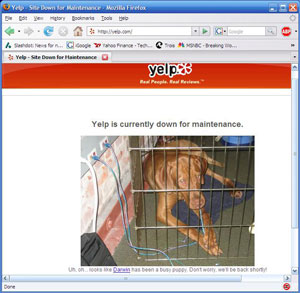As always, what I am writing here is my own opinion and not a statement on behalf of Mozilla Corporation.
When I was just visiting Wikipedia, I was greeted with this temporary error note (which, luckily, does not happen too often in spite of Wikipedia's huge popularity):

And, even if this marks me as a Web 2.0 geek, I must admit: All I was thinking was -- where's the pet?
The first company to put a recognizable, even likable, "pet" onto their error pages was likely Twitter. And due to the horribly frequent outages associated with Twitter's "growing pain", we got to see the littlehuge fellow quite often. In the mean time, he seems to have swam away, at least I haven't seen him in awhile. Yet, he's not forgotten: the fail whale even has his own fanclub.

Another place where I saw a "fail pet" was yelp, whose error page was sporting a picture of an actual dog, apparently the company puppy "Darwin" (sorry for the tiny screenshot):

Now where's yours, Wikipedia?
Of course, considering I so provocatively ask this question, you might respond: Well, where's yours, Mozilla?
Here at Mozilla, we are not particularly proud of software failures, because unlike your regular web 2.0 start-up (think Twitter) where every service failure means more customers than anticipated, failures in Mozilla-land usually mean a crashed browser, (possibly) lost data and certainly frowning users*). So when the Crash Reporter icon was redesigned, we could have gone ahead and hired Foxkeh as our "crash mascot", but that would do the poor little fox wrong -- and at any rate, we prefer associating mascots with good stuff here at Mozilla. So at the time, user experience engineer Alex Faaborg made sure we don't create something too memorable, for example nothing like a second "Blue Screen of Death". Of course, had Microsoft known at the time how appeasing error messages can become with a little help from the animal kingdom, they'd have hired the entire cast of Looney Tunes to show up in their dreaded error messages.
But this might well be one of the few things we have in common with Microsoft: No fail-pets for us, any time soon.
*) On a side note, although it won't make a user fell better whose browser just crashed: When Firefox crashes it is most often due to binary, third-party plug-ins like Flash, Acrobat etc., and not due to a bug in Mozilla software -- as evidenced by the publicly available "top crashes" list and the bugs associated with it.



